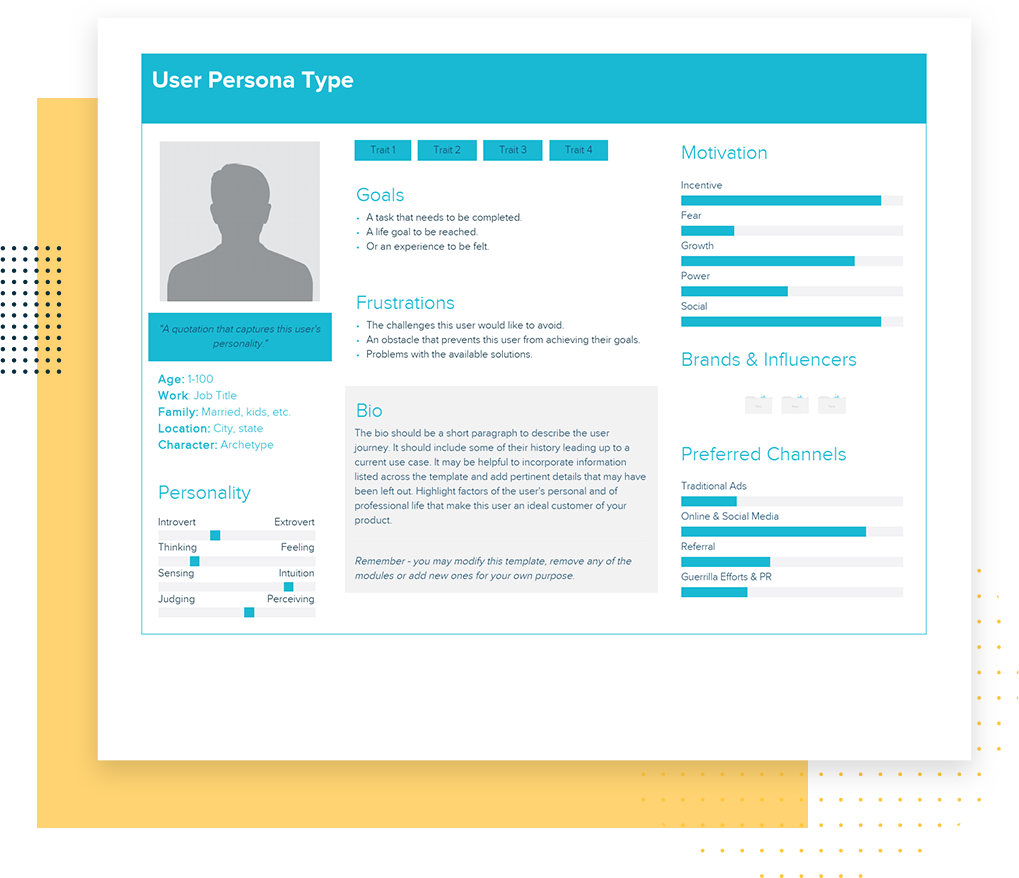Persona is the name of the magical entities your party of heroes can call in battle to perform spells to heal and attack. Each party member can hold three Persona and invoke one. Persona meld into the user's mind and grant your their magic and attributes such as Strong against Ice and Weak against Fire. A persona is the way a person presents himself or herself to the world, the character traits others see in this person. You’ll see personas in literature, as well as in life. Learning how to spot a persona and how to create one in a nuanced way can help you more effectively connect with an audience.
Customer Persona. The customer persona is a catchall term to describe your product’s main persona. It might be the user persona, for example, for a B2B product or be the buyer and user for a consumer-oriented product. For a business that sells products to other businesses, a customer persona could represent either the user or the buyer personas.
Also found in: Thesaurus, Medical, Idioms, Encyclopedia, Wikipedia.
per·so·na
(pər-sō′nə)n.persona
(pɜːˈsəʊnə) n, pl-nae (-niː)
per•so•na
(pərˈsoʊ nə)n., pl. -nae (-nē), -nas.
| Noun | 1. | persona - an actor's portrayal of someone in a play; 'she played the part of Desdemona' theatrical role, role, character, part personation, portrayal, characterization, enactment - acting the part of a character on stage; dramatically representing the character by speech and action and gesture heavy - a serious (or tragic) role in a play hero - the principal character in a play or movie or novel or poem ingenue - the role of an innocent artless young woman in a play name part, title role - the role of the character after whom the play is named heroine - the main good female character in a work of fiction baddie, villain - the principal bad character in a film or work of fiction |
| 2. | persona - (Jungian psychology) a personal facade that one presents to the world; 'a public image is as fragile as Humpty Dumpty' appearance, visual aspect - outward or visible aspect of a person or thing psychological science, psychology - the science of mental life Carl Gustav Jung, Carl Jung, Jung - Swiss psychologist (1875-1961) |
persona
persona
nounpersona
[pɜːˈsəʊnə]N (personae (pl)) [pɜːˈsəʊnaɪ]persona non grata → personaf no grata
persona
[pərˈsəʊnə]n (= image) → personnagem
(= image) → personnagempublic persona → personne publique
to take on a new persona → se créer un nouveaupersonnage
persona
per·so·na
Want to thank TFD for its existence? Tell a friend about us, add a link to this page, or visit the webmaster's page for free fun content.
Link to this page:
A persona is the way a person presents himself or herself to the world, the character traits others see in this person. You’ll see personas in literature, as well as in life. Learning how to spot a persona and how to create one in a nuanced way can help you more effectively connect with an audience.
Persona Examples in Life
Since your persona is the part of yourself that you present to the world, it likely represents only one side of your personality. You can identify a persona by thinking about what the person has to gain from the character he or she puts on. Additionally, observing someone in other contexts can help reveal discrepancies in the character they reveal.
Some examples of different personas in real life include the following.

Personas in Politics
Politicians use personas to create a connection with their voters. For instance, a politician may want to come off to voters as a regular, nice guy who cares about normal people. He uses folksy language, colloquialisms, and common metaphors. Perhaps he appears on TV shows and is congenial, and he is always friendly and joking. He has a positive public persona as someone who cares about others - whether or not this matches with who he truly is inside.
Personas in Business
In the business world, a persona is about perception. For instance, if a businessman wants others to think that he is very powerful and successful, he might drive a fancy car, buy a big house, wear expensive clothing, and talk down to people that he thinks are below him on the social ladder.
On the other hand, a business person might want others to think that he is charitable and kind. He offers lots of benefits and perks to his employees, and he makes sure that his business publicly gives lots of money to charities and positive social causes. His persona is that he is a good guy.
Personas in Social Situations
You can also use personas in social situations. For example, a child going to a new school for the first time wants others to think that he is popular, cool, and unafraid. He dresses in fashionable clothing, and he walks in with confidence and says hello to everyone. He is presenting a brave persona of a likable and popular kid.
Similarly, a person who is trying to find a spouse may create a fun and flirty profile on an online dating website, being sure to use positive language and emphasize his or her good attributes. The person is creating a positive public persona of someone it would be fun to date or join in a relationship.
Personas in Web Content
If you’re writing internet content or selling a product or service online, audience personas can be a valuable tool, according to usability.gov. To make a persona, you assess what you know about your audience, including demographics, preferences, and historical choices. Then you create a description of the person who may be reading your site. This description, which should be as detailed as possible, is called a persona. It lets you create content with a clear idea of the audience in mind.
Persona Examples From Literature
A persona is also a literary device. An author takes on a character while writing, usually telling the story or poem in the first person. The character who is speaking is not the writer, although it is easy to confuse them. One key way to identify a literary persona is to think about the narrator or speaker and decide whether that character really matches with the biography of the writer. These are some key examples of persona in literature.
My Last Duchess by Robert Browning
In My Last Duchess, poet Robert Browning uses persona to create the character of the speaker, a duke:
Kelly Ripa Vitamin
That’s my last Duchess painted on the wall,
Looking as if she were alive. I call
That piece a wonder, now; Fra Pandolf’s hands
Worked busily a day, and there she stands.
Will’t please you sit and look at her? I said
“Fra Pandolf” by design, for never read
Strangers like you that pictured countenance,
The depth and passion of its earnest glance,
But to myself they turned (since none puts by
The curtain I have drawn for you, but I)
And seemed as they would ask me, if they durst,
How such a glance came there; so, not the first
Are you to turn and ask thus. Sir, ’twas not
Her husband’s presence only, called that spot
Of joy into the Duchess’ cheek….
The Love Song of J. Alfred Prufrock by T. S. Eliot
Another famous example of persona in literature is The Love Song of J. Alfred Prufrock by T. S. Eliot. In this poem, the speaker is not the poet at all but a clearly defined character.
And would it have been worth it, after all,
After the cups, the marmalade, the tea,
Among the porcelain, among some talk of you and me,
Would it have been worth while,
To have bitten off the matter with a smile,
To have squeezed the universe into a ball
To roll it towards some overwhelming question,
To say: “I am Lazarus, come from the dead,
Personal Capital
Come back to tell you all, I shall tell you all”—
If one, settling a pillow by her head
Personality Traits
Should say: “That is not what I meant at all;
That is not it, at all.”
Lolita by Vladimir Nabokov
In his famous novel, Lolita, Vladimir Nabokov writes in the character of Humbert Humbert. Through this persona, he tells the story of Humbert’s life and his interactions with the title character, Lolita.
I was born in 1910, in Paris. My father was a gentle, easy-going person, a salad of racial genes: a Swiss citizen, of mixed French and Austrian descent, with a dash of the Danube in his veins. I am going to pass around in a minute some lovely, glossy-blue picture-postcards. He owned a luxurious hotel on the Riviera. His father and two grandfathers had sold wine, jewels and silk, respectively. At thirty he married an English girl, daughter of Jerome Dunn, the alpinist, and granddaughter of two Dorset parsons, experts in obscure subjects-paleopedology and Aeolian harps, respectively. My very photogenic mother died in a freak accident (picnic, lightning) when I was three, and, save for a pocket of warmth in the darkest past, nothing of her subsists within the hollows and dells of memory, over which, if you can still stand my style (I am writing under observation), the sun of my infancy had set: surely, you all know those redolent remnants of day suspended, with the midges, about some hedge in bloom or suddenly entered and traversed by the rambler, at the bottom of a hill, in the summer dusk; a furry warmth, golden midges.
Experiment With Persona in Your Own Writing
Whether a writer is using a persona to create a compelling story or poem or a person is using a persona to better control the image he or she presents to the outside world, this device is a powerful way to craft a message and connect with an audience. Have fun and experiment with the use of persona in your own work, whether you’re writing a poem or a blog post.
Persona 5
B.A. English
